

Art works. Z6_OAA613C0JOC5D0AORP5RCNG014/wps/portal/hermitage/digital-collectionArt worksenltr/Hermitage/Art works <div class="lotusMessage2" role="alert" wairole="alert"><img class="lotusIcon lotusIconMsgError" src="icons/blank.gif" alt="Error" /><span class="lotusAltText">Error:</span><div class="lotusMessageBody">Javascript is disabled in this browser.
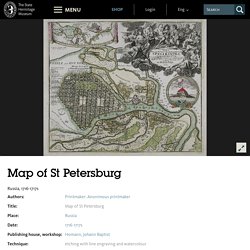
This page requires Javascript. Modify your browser's settings to allow Javascript to execute. See your browser's documentation for specific instructions. </div></div> The Literary And/As the Digital Humanities. The Digital Humanities depends in large part upon the literary.
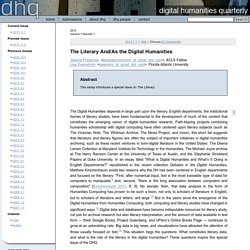
English departments, the institutional homes of literary studies, have been fundamental to the development of much of the content that constitutes the emerging canon of digital humanities research. Path-blazing projects combining humanities scholarship with digital computing have often centered upon literary subjects (such as The Victorian Web, The Whitman Archive, The Nines Project, and more); this short list suggests that literature and literary figures are often the subject of important initiatives in digital humanities archiving, such as these recent ventures in born-digital literature in the United States: The Deena Larsen Collection at Maryland Institute for Technology in the Humanities, The Michael Joyce archive at The Harry Ransom Center at the University of Texas at Austin, and the Stephanie Strickland Papers at Duke University.
Artists' Books Online.
Irish Sheet Music Archives - Irish Songs - Ward Irish Music Archives. View of Victoria, Vancouver Island. S digitala stadsmuseum — Visa alla. Photogrammar. Αναζήτηση - βάση δεδομένων. Search ariadne. ICA-AtoM users - ICA-AtoM. ICA-AtoM users From ICA-AtoM Jump to: navigation, search Please note that ICA-AtoM is no longer actively supported by Artefactual Systems.Visit for information about AtoM, the currently supported version.
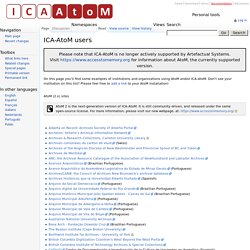
Open-Sourcing MoMA’s Digital Vault. Posted by Ben Fino-Radin, Associate Media Conservator, Department of Conservation In my previous post we introduced MoMA’s digital art vault, and two of its components: Archivematica (aka “the packager”) and Arkivum (aka “the warehouse”).
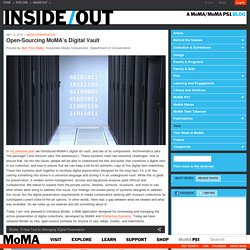
These systems meet two essential challenges: how to ensure that, far into the future, people will be able to understand the bits and bytes that constitute a digital item in our collection, and how to ensure that we can keep a bit-for-bit authentic copy of this digital item indefinitely. These two systems work together to facilitate digital preservation designed for the long haul; it’s a bit like carving something into stone in a universal language and storing it in an underground vault.
While this is great for preservation, it renders active management, access and big-picture analysis quite difficult and cumbersome. We talked to experts from the private sector, libraries, archives, museums, and more to see what others were doing to address this issue. Σύστημα Διαχείρισης Θησαυρών. Στο πλαίσιο του έργου DARIAH-GR άρχισε η ανάπτυξη ενός θησαυρού όρων που ενδιαφέρουν τους ερευνητές των ανθρωπιστικών επιστημών.
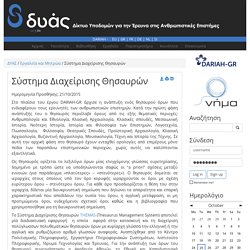
Κατά την πρώτη φάση ανάπτυξής του ο θησαυρός περιέλαβε όρους από τις εξής θεματικές περιοχές: Ανθρωπολογία και Εθνολογία, Κλασική Αρχαιολογία, Κλασικές σπουδές, Μεσαιωνική Ιστορία, Νεότερη Ιστορία, Ιστορία και Φιλοσοφία των Επιστημών, Λογοτεχνία, Γλωσσολογία, Φιλοσοφία, Θεατρικές Σπουδές, Προϊστορική Αρχαιολογία, Κλασική Αρχαιολογία, Βυζαντινή Αρχαιολογία, Μουσικολογία, Τέχνη και Ιστορία της Τέχνης. Ελληνική Αρχειακή Εταιρεία. Αρχεία ΠΙΟΠ - Αρχείο Κεντρικής Επιτροπής Δανείων. Library of Congress. Home. Census records. This guide tells you how to access the historical censuses from 1841 to 1911 and provides information for researchers using the census returns of: All later censuses remain in the custody of the Office for National Statistics.
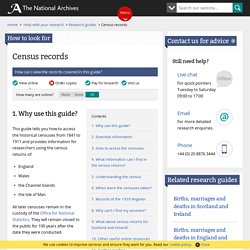
They will remain closed to the public for 100 years after the date they were conducted. Read section 9 for more information on the census returns for Scotland and Ireland. 2. Essential information A census has been taken every ten years since 1801 with the exception of 1941. Untitled. Εθνική Βιβλιοθήκη catalog › Authority search result. Ιστορία. ΕΚΤ - Θησαυρός Ελληνικών Όρων. Ο πρώτος Θησαυρός Ελληνικών Όρων που διατίθεται ελεύθερα στο Διαδίκτυο, αποτελεί ένα ακόμη σημαντικό βιβλιοθηκονομικό εργαλείο που αναπτύχθηκε από το ΕΚΤ.
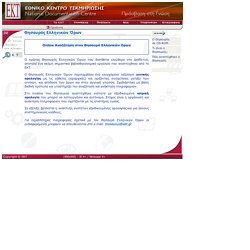
Ο Θησαυρός Ελληνικών Όρων περιλαμβάνει ένα ελεγχόμενο λεξιλόγιο γενικής ορολογίας με τις κάθετες (ιεραρχικές) και οριζόντιες συσχετίσεις μεταξύ των εννοιών, και απόδοση των όρων και στην αγγλική γλώσσα. Πανδέκτης: Communities and Collections. Library of Congress Authorities. ΠΟ.Θ.Ε.Γ. » Going Meta on Metadata Journal of Digital Humanities. Michael J.
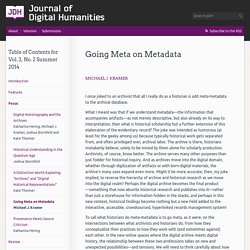
Kramer I once joked to an archivist that all I really do as a historian is add meta-metadata to the archival database. What I meant was that if we understand metadata—the information that accompanies artifacts—as not merely descriptive, but also already on its way to interpretation, then what is historical scholarship but a further extension of this elaboration of the evidentiary record? The joke was intended as humorous (at least for the geeky among us) because typically historical work gets separated from, and often privileged over, archival labor. The archive is there, historians mistakenly believe, solely to be mined by them alone for scholarly production.
To call what historians do meta-metadata is to go meta, as it were, on the intersections between what archivists and historians do, from how they conceptualize their practices to how they work with (and sometimes against) each other. The Digital. 2: Metadata and Text Markup » Tooling Up for Digital Humanities. Metadata comprises the “data about data” – information associated with archival material that lists key attributes, such as its author, date, publisher, or general subject.
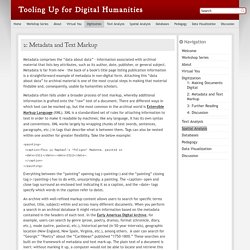
Metadata is far from new – the back of a book’s title page listing publication information is a straightforward example of metadata in non-digital form. Attaching this “data about data” to archival material is one of the most crucial steps in making that material findable and, consequently, usable by humanities scholars. Metadata often falls under a broader process of text markup, whereby additional information is grafted onto the “raw” text of a document. There are different ways in which text can be marked up, but the most common in the archival world is Extensible Markup Language (XML). Center for Digital Humanities - UCLA. Metadata Central: Digital scholarship and outreach Jump to Kickoff Workshop Program for February 11-12, 2016 Metadata are central in humanities scholarship.
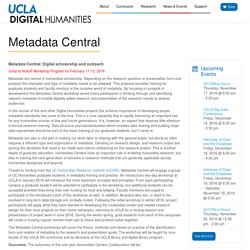
Depending on the research question or presentation form and purpose the character and type of metadata needs to be adapted. This proposal provides training for graduate students and faculty mentors in the complex world of metadata. By focusing on projects in development the Metadata Central workshop series trains participants in thinking through and identifying relevant metadata to enable digitally aided research and presentation of the research results to diverse audiences.
In the course of this and other Digital Humanities projects the extreme importance of developing proper metadata standards has come to the fore. Metadata are also a vital part in making our work open to sharing with the general public, but doing so often requires a different type and organization of metadata. Outcomes. Kickoff Workshop Program. Digital Humanities: Data modelling and metadata - Projects - Research - Home - Herzog August Bibliothek Wolfenbüttel. Project in the cluster “digital research infrastructure” in the research network Marbach – Weimar – WolfenbüttelIn collaboration with the digital humanities projects in Weimar and Marbach, a digital research infrastructure is being built for the MWW research association. The data that will be integrated into this research environment encompasses not only the central digital holdings of the three institutions, but also comprises resources from specialist databases and research projects as well.
Thus, for the first time, it will be possible to present together, in terms of scholarly content, high-value research data. Extensive search options and innovative tools will moreover open up new ways for scholars to access and work with the material. To achieve this, the metadata – either that already connected to the holdings or that which still needs to be developed – is to be integrated into the virtual research centre and thus merged together. Metadata Games – Digital Humanities.